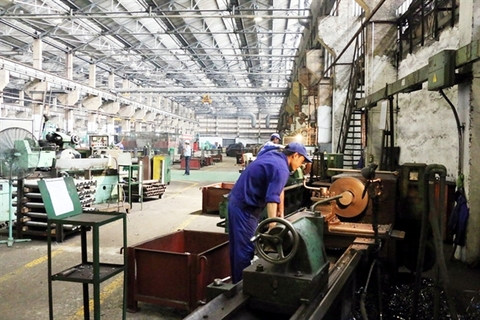
Domestic mechanical engineering companies are struggling to compete with foreign competitors, even in the domestic market. — File Photo
Viet Nam needs to increase policies to promote the development of the domestic mechanical engineering industry and enable local manufacturers to compete with foreign competitors.
According to the Viet Nam Mechanical Association, despite being considered as a spearhead industry, mechanical engineering enterprises have for many years struggled to find ways to develop and compete even in the domestic market,
Nguyen Duong Hieu, chairman of Lidovit Trading and Industrial Joint Stock Company, said current policies for the mechanics market remained unclear, adding that there were no mandatory requirements on the local procurement rates in works or projects which pushed domestic manufacturers into difficulty when competing even in the home market.
Hieu said that his company could not be a direct contractor but must go through a Japanese enterprise to supply screws for the metro project in HCM City.
Vu Van Dao, director of the Southern Petroleum Construction Joint Stock Company, said although his company produced and exported around 90 per cent of mechanical equipment in the petroleum sector to more than 30 countries worldwide, it failed to access the domestic market.
Dao said his company must go through two foreign enterprises to become contractor of some local petroleum projects.
The shortage of policies and capital was a major difficulty hit for mechanical engineering enterprises, Dao Phan Long, president of the Viet Nam’s Mechanical Association, said.
Long said that to develop key mechanical products, enterprises needed support in term of policies, especially domestic market protection policies.
It was also necessary to provide support policies for project owners who used domestically-produced mechanical products, he added. Specifically, a stable loan interest rate of five per cent could be put into consideration.
In order to promote the development of the domestic mechanical engineering industry, the Ministry of Industry and Trade had proposed a number of policies. One was to encourage large projects, especially State-funded, to use domestically-produced mechanical products.
The ministry said that it was necessary to have land incentive policies for projects which produce key mechanical products, which was similar to policies to encourage investment in agriculture and rural development.
The ministry proposed projects which produce key mechanical products be provided with exemptions of land lease fees in the first 11 years of operation and reduction by 50 per cent for a further five years.
Policies to attract foreign investments and promote the development of the supporting industries for the mechanical engineering industry were also needed, the ministry said. — VNS